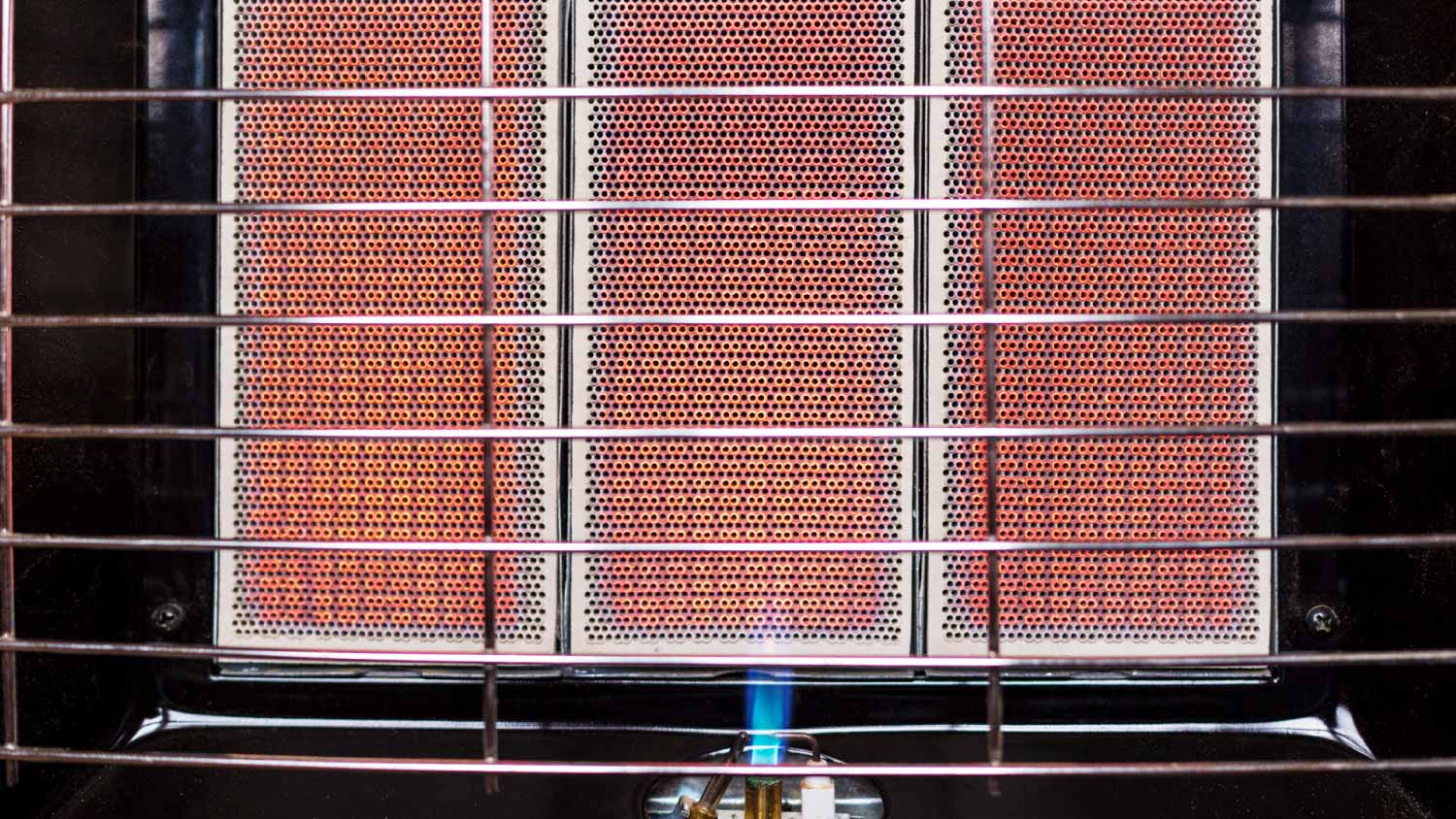Can You Use a Propane Heater in a Garage?
Don’t sweat it—these portable heaters are safe, so long as you follow safety guidelines


Propane heaters use propane gas in a tank to generate heat.
Propane heaters must be used in well-ventilated spaces to reduce the risk of carbon monoxide poisoning.
There are three types of propane heaters: radiant, catalytic, and convection.
Propane heaters can be used in a garage if they’re rated for indoor use.
Wondering whether you can use a propane heater in your garage? The short answer is yes, but only with the proper safety precautions. Stay warm in your garage year-round by equipping it with a propane heater. Let’s review how to safely use a propane heater.
What Is a Propane Heater?
A propane heater is a type of space heater that uses propane gas as its fuel source, which generates heat. The propane is stored in a pressurized tank directly connected to the heater. Most propane heaters are used in indoor-outdoor spaces, such as garages, workshops, and camping sites.
The most important thing to consider before purchasing a propane heater is ensuring the space has the proper ventilation to prevent carbon monoxide build-up. Check to see if your propane heater or the one you’re considering purchasing has an automatic shut-off mechanism to reduce any risks.
How to Tell if You Can Use a Propane Heater Can be Used in a Garage
The surefire way to know whether a propane heater can be used in a garage is to see if it’s rated for indoor use. If so, it’s safe to use in your garage or other enclosed areas. Check if the heater is rated by a recognized safety organization such as the CSA, which is the U.S. government’s compliance and safety enforcement program. You can also contact your local furnace repair company to see if the heater you’re interested in is recommended.
Types of Propane Heaters

There are several types of propane heaters that may suit your needs based on how they emit heat.
Convection
Convection heaters distribute warm air over a large space by blowing air over a chamber or heated element. They’re best for warming up large areas in a short timespan.
Radiant
This type of propane heater uses an infrared panel that heats things around it, as opposed to the air. Radiant propane heaters are extremely portable and typically used in outdoor settings.
Catalytic
If you need to use a propane heater in a flame-free environment, a catalytic model might be a good fit. It uses a catalytic process (hence the name) to produce heat with lower emissions and less flame.
Safety Tips for Using a Propane Heater In a Garage
Even if your space heater is marked safe to use in a garage, it’s still important to put a number of safety measures in place to ensure no mishaps occur.
Clear the Space
No matter where you place your propane heater, make sure there’s enough free space around it. Place it at least six inches away from any walls, furniture, or other obstacles. Refrain from placing anything on top of the heater to prevent a fire hazard.
Use a Carbon Monoxide Monitor
It helps to place a carbon monoxide monitor in or around your garage to detect harmful leaks. If the alarm goes off, exit the area quickly and notify emergency services of a potential gas leak.
Stay Alert for Strong Odors
Become aware of what smell propane emits if leaked. Some people say propane has a rotten egg-like scent. The presence of this smell could indicate a potentially dangerous leak in the heater. If this happens, call 911 or other emergency hotlines for assistance.
Frequently Asked Questions
To determine what size propane heater is best for your garage, you’ll need to factor in about 25 to 30 British Thermal Units (BTUs) per square foot. For example, if you have a 500-square-foot garage, you’ll need to purchase a propane heater with at least 12,500 to 15,000 BTUs.
No, it is not safe to leave a propane heater on overnight. Even if you’re using the heater in a well-ventilated space, the heaters can emit carbon monoxide that can lead to fires. Be sure to fully turn off and secure the propane heater before clearing the area.





- Furnace Repair
- Air Conditioning Repair
- HVAC Repairs
- Furnace Installation
- Wood & Pellet Stove Repair
- Dehumidifier & Humidifier Repair
- Heat Pump Companies
- Swamp Cooler Repair
- Wood Stove Services
- HVAC Companies
- Commercial A/C Repair
- Geothermal Installation
- Air Conditioning Installation
- Boiler Repair
- 24 Hour Furnace Repair
- Geothermal Repair
- Heat Pump Repair
- Humidifier Installation
- Thermostat Repair
- Thermostat Installation
- Nest Installation
- Heating & Cooling
- Heating Repair
- Furnace Cleaning
- Furnace Tune-Up
- HVAC Technicians
- Subcontractors
- Furnace Maintenance
- Plumbing & Heating Companies
- Wood Stove Inspection
- Mini Split Installation
- Wall Heater Repair
- Duct Installers
- Are Propane Heaters Safe for Indoor Use? Risks and Safety Tips
- Can You Use a Patio Heater in a Garage?
- How to Dispose of a Propane Tank Properly
- Top 7 Signs You Need a New Water Heater
- How to Heat a Garage for the Winter: 7 Must-Know Tips
- Water Heater Inspection Checklists: What You Should Know
- Common Reasons Why the Water Heater Keeps Turning Off
- 7 Types of Water Heaters and How to Select the Right One for Your Home
- 6 Signs Of Water Heater Failure
- How Long Does a Water Heater Last? Should You Replace It?










